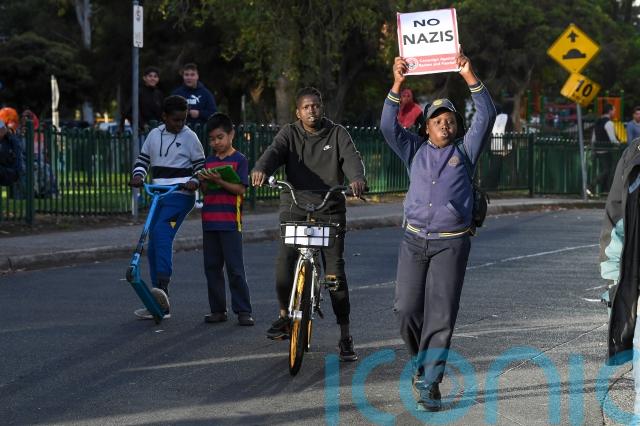
An Australian state has become the first in the country to pass a law banning the public display of Nazi swastikas.
It comes as concerns grow about the rate at which local young people are being radicalised.
The Parliament of Victoria, Australia’s second-most populous state, passed laws late on Tuesday that set penalties of 22,000 Australian dollars (£12,388) and 12 months in prison for displaying the Nazi swastika, or Hakenkreuz.
Dvir Abramovich, chairman of the Anti-Defamation Commission, which fights antisemitism, said on Wednesday he expects Australia’s most populous state, New South Wales, and the states of Queensland and Tasmania will soon pass similar laws.
“The fact that we’ve got a resurgent white supremacist and neo-Nazi movement is a cause for concern in every state,” said Mr Abramovich, who lives in the Victorian capital, Melbourne.

“What the Bill does is to say to those forces of evil that are trying to break our spirit and instil fear that the law’s no longer on their side,” he added.
Mr Abramovich began a national campaign to ban the Nazi symbol five years ago.
The law becomes official in two weeks and the ban takes effect six months later following a public education campaign.
The law does not prohibit the display of swastikas in certain religious and cultural contexts.
The swastika for Buddhist, Hindu, Jain and other faith communities was an ancient and sacred symbol, a Victoria government statement said.
Victorian attorney-general Jaclyn Symes said she is proud the law passed with the support of opposition politicians.
“I’m glad to see that no matter what side of politics, we can agree that this vile behaviour will not be tolerated in Victoria,” Ms Symes said.
Mike Burgess, directory-general of the Australian Security Intelligence Organisation (ASIO), the nation’s main domestic spy agency, said in his annual threat assessment in February that concerns were growing about the rate at which young people were being radicalised.
Children as young as 13 were embracing extremism, both religiously and ideologically motivated, Mr Burgess said.
Three years ago, minors represented less than 3% of ASIO’s new counter-terrorism investigations.
Last year, they accounted for 15% of such investigations and most of ASIO’s highest-priority investigations, Mr Burgess said.
Subscribe or register today to discover more from DonegalLive.ie
Buy the e-paper of the Donegal Democrat, Donegal People's Press, Donegal Post and Inish Times here for instant access to Donegal's premier news titles.
Keep up with the latest news from Donegal with our daily newsletter featuring the most important stories of the day delivered to your inbox every evening at 5pm.